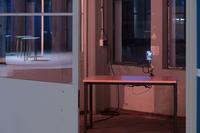Chapter 5IVE
Harvest on Demand-compilation (2022)
Harvest on Demand-compilation, 2022
Found Footage
In China, social media use in the countryside has expanded enormously in recent years, and as a result, the distance between the city and the countryside is becoming increasingly smaller. During the lockdown period, a particular phenomenon emerged: influencers started to market agricultural products via ‘harvest on demand’; through their screens, consumers point out the pineapple they wish to have in the field themselves, after which it is delivered to their homes. The TikTok compilation video shows the intensity of this recent phenomenon. After the supermarket, depicted
in Christian Jankowski’s video, the online marketplace with home delivery removes us one step further from the ‘hunter and gatherer’ existence. We no longer need to leave our homes to find food. At the same time, this phenomenon also brings us one step closer to the work of agriculture, the passing of the seasons and the size of the harvest, albeit as passive spectators. Will this real-time experience result in us becoming more aware of the rhythm of nature? Or will it lead us to impose our rhythm and obsession with profit maximisation on nature to an even greater extent?
